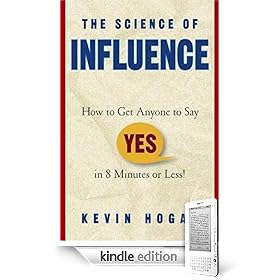 It doesn't take loing before you start hearing consultants speaking who are just carbon copies of Alan Weiss, Seth Godin or Bob Berg. There are only a few really original people out there in the world of solo consultants.
It doesn't take loing before you start hearing consultants speaking who are just carbon copies of Alan Weiss, Seth Godin or Bob Berg. There are only a few really original people out there in the world of solo consultants.And of all of them, Kevin Hogan is among the most original. I first became aware of Kevin's work while watching a BBC documentary talking about the bodylanguage of Tony Blair and George Bush. Since then I have discovered The Science of Influence and Covert Persuasion, two of his books that travel with me everywhere.
Kevin is THE world leader in influencing and persuasion techniques, and has an incredible depth of knowledge in these areas. His best seller is The Psychology of Persuasion, and he has written 19 others in total. He runs a licensee program, mentoring programs and has spoken all over the world...including the PlayBoy Mansion!! (That's the gig I want!)
CP: Good influencing skills can be a game changer for consulting professionals. Like a close up magician most of them find themselves speaking, pitching and negotiating with small groups.
What specific skill or technique separates people who can do this successfully?
What specific skill or technique separates people who can do this successfully?
KH: When you combine the Pygmallion Effect with Certainty you have a good start. The Pygmallion Effect is a scientifically proven phenomenon. Your expectations of another person or group shape and mold that group, if you are seen as a driving force, as a "leader." People often become the label that is attached to them.
When told their diagnosis of a mental or emotional problem the symptoms become more pronounced and if there was a misdiagnosis originally there will be real indicators now. We mold people in our image.
You're angry with your spouse so you pick up a book about Borderline Personality or Bipolar, for example. Regardless of whether the diagnosis (if any) is right or wrong, people see what they want in other people and as they behave as if the person has that diagnosis, they help shape that diagnosis.
The same is true for all aspects of psychological and social psychological experience.
If I am absolutely certain that you will behave in a certain way, the probability that you will do so is increased significantly and indeed if you weren't going to behave that way originally you very well might now.
If I am absolutely certain that you will behave in a certain way, the probability that you will do so is increased significantly and indeed if you weren't going to behave that way originally you very well might now.
There are preconditions.
You must seen as important or as credible, an authority, significant or your attitudes and behaviors will not be influential.
It's socio/neurobiology, not magic.
Certainty is defined as "grocery store certainty."
If you are certain to the degree that you are certain you have the ability to go grocery shopping, that you are capable of pushing a cart and don't require affirmations to get home and put the groceries away....that is the level of offhanded certainty that is persuasive.
When people say, "I'm going grocery shopping," you believe it, you don't question it, you assume there will be food in the cupboard in a couple of hours.
That is the certainty that persuades.
CP: Do you think the skills and abilities needed for good influencing ability have had to evolve with the information age? Or is it still best practiced as a contact sport?
KH:There's lots of mediums for communication and influence.
CP: Do you think the skills and abilities needed for good influencing ability have had to evolve with the information age? Or is it still best practiced as a contact sport?
KH:There's lots of mediums for communication and influence.
Originally we had face to face.
Then we drew on walls in caves.
Then we threatened with weapons.
Then we learned to write compellingly starting with the most influential document in the world, The Bible.
Then radio and television shaped society and culture.
Now myspace, facebook, youtube and the results at google help shape thinking, beliefs, attitudes, lifestyles.
Influence and persuasion happen in all venues and locations. It's not just a contact sport.
CP: Many of our readers are in private consultancy, building a business, or contemplating a move to private consultancy.
How can we frame the current economic situation to help increase revenues?
CP: Many of our readers are in private consultancy, building a business, or contemplating a move to private consultancy.
How can we frame the current economic situation to help increase revenues?
KH: The biggest reason people are suffering today financially is that people trusted the wrong people. We trusted banks and insurance companies to take care of our money and secure it. We trusted investment groups to manage our money. Greed took over and the people who got creamed were the people who were trusting.
Now the same people that got hurt are told they will "bailout" the people that hurt them. It is an irony.
If you are in business and you want to be bold, point out the fact that this is how the world got to "here" and that you get it, you're not going to let people down and tell them why. You either give a damn or you don't.
Certainty and authenticity combine for a powerful one two punch of persuasion and influence.
There's no reason people can't build thriving businesses in the recession and perhaps soon to be depression. People will get their food from someone. They will buy their clothes from someone.
They will buy soap and tissues from someone.
If you want to be persuasive realize that fear kills your business. So walk into the fire and meet the fears you have head on. Fear causes salespeople to press. To push, to shove, to cause themselves to look "needy."
Don't.
If THIS sale means THAT much to you, you aren't going to make it. You'll need to think a little longer term and a little more about your customer than you ever have, or you will fail.
CP: The elevator pitch is vital for us. Introductions and chance meetings are regular events.
So as you meet this important person for 2 minutes, and you need to impress them to the point where they will meet you again, what sorts of techniques are of use there?
KH: Decision makers make decisions shockingly fast. The scientific research is crystal clear. On a recent book we used the subtitle ..."in 8 minutes or last." The fact is that was an exaggeration. It doesn't take 8 minutes to make a sale. It takes less than 17 seconds.
CP: The elevator pitch is vital for us. Introductions and chance meetings are regular events.
So as you meet this important person for 2 minutes, and you need to impress them to the point where they will meet you again, what sorts of techniques are of use there?
KH: Decision makers make decisions shockingly fast. The scientific research is crystal clear. On a recent book we used the subtitle ..."in 8 minutes or last." The fact is that was an exaggeration. It doesn't take 8 minutes to make a sale. It takes less than 17 seconds.
"Hi, I'm Kevin Hogan, I speak at corporate events and teach cutting edge influence and communication strategies that are geared toward increasing clientele and the probability of purchase by those clients. I'm the author of The Psychology of Persuasion. What do you do?"
I'm done.
If you're on the elevator that is how it works.
If you're at the blackjack table or in the bar it's a little different and you're better off asking questions to discover valuable insights into the other person. You can then create a frame and a message. Otherwise you're playing a game of random communication.
CP: You are a world renowned expert on body language as well as influencing. Can the two work together, and what sort of benefits do you typically see from businesses like our when we focus on developing our influencing skills?
CP: You are a world renowned expert on body language as well as influencing. Can the two work together, and what sort of benefits do you typically see from businesses like our when we focus on developing our influencing skills?
Nonverbal communication includes body language but it also includes much more. It includes where the person just came from...the bathroom, church, a play, a movie, the store, getting groceries. All of these things prime the person's very next behavior and you are intersecting with all of these non-word experiences.
The problem is people believe that their words make this huge difference. People want to know how to wield words because they are concrete. But the fact is that people who learn the words to the song can't sing it without the music and the setting and the band.
The context of where persuasion (communication with a purpose) is taking place is more important than the body language of the person and the body language is more important than the words.
People need to quit trying to figure out the words and learn the tune, the acoustics, the chords, the notes, the auditorium and where everyone just came from. The last experience and the next after they leave you, all impact that person's experience of you long before you see that person.
 Having a deep and detailed knowledge of persuasion and influencing techniques is a game changer for anybody even remotely connected to the consulting and sales games.
Having a deep and detailed knowledge of persuasion and influencing techniques is a game changer for anybody even remotely connected to the consulting and sales games.His books on influence, particularly The Science of Influence, have given me techniques that I use every single day of my career.
In fact, I have tied some of the Covert Persuasion techniques drectly into my training and conference appearances and they have boosted my conversion rates, and helped me to cement myself in peoples minds as the obvious expert.
When it comes to consulting skills people tend to focus on relationships, sales, marketing, project management, presenting and speaking generally.
And while all of these are useful areas, everybody focuses on these. They are ordinary. Persuasion and influence techniques however - are definitely extra-ordinary.
For solo consultants out there - kevin also runs a mentoring program and a licensee program. So you could even find yourself helping others in the arts of persuasion... something I am considering...


